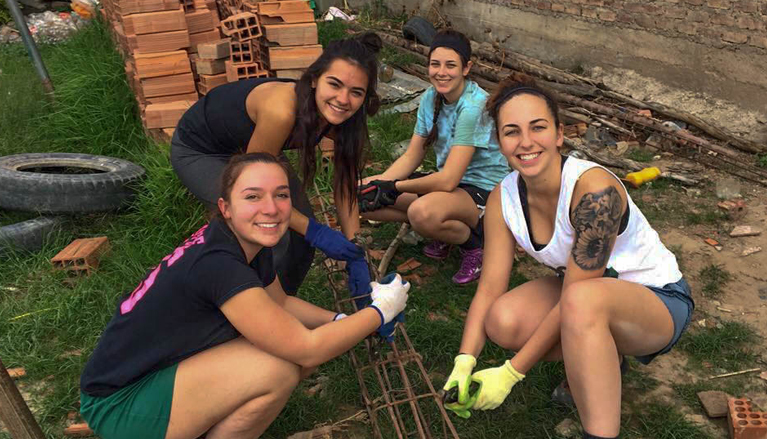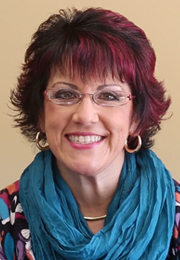SRU President’s Commission offers February Race and Ethnic Diversity programs

A recent CareBreaks service trip to Bolivia will be the focus of a panel discussion at the end of the month
Jan. 26, 2016
SLIPPERY ROCK, Pa. - It is always a good idea to have conversions about race and diversity to bridge cultural gaps and promote unity, says Christine Pease-Hernandez, Slippery Rock University assistant professor of communication.

PEASE-HERNANDEZ
"We need to be constantly learning about interacting with people who are different from us," she said. "We're not going to live in a bubble. I want to have hope. I want to continue to hope."
The SRU community will have plenty of opportunities to talk and learn about embracing differences and confronting the challenges of racism during February's President's Commission on Race and Ethnic Diversity Month. The President's Commission on Race and Ethnic Diversity will offer its own programs and some in tandem with Black History Month in February.
"For our commission, it's more abut race and ethnic diversity in trying to spread the word that we understand that differences are going to exist and how do we navigate and how do we work with people who are different than us in terms of race and diversity?" Pease-Hernandez said.
Pease-Hernandez co-chairs the commission, along with Marketa Schublova, assistant professor of exercise and rehabilitative sciences.
The goal of the commission is to prepare students to be culturally aware, socially engaged citizens. In pursuing this mission, the commission offers diversity and inclusion workshops, monthly discussions, programs and speakers. The commission begins to raise awareness of diversity on campus during SRU's FYRST Seminar offered during first-year student orientation.
Pease-Hernandez said one of the challenges with racism is racists often suppress their feelings, until they interact in an anonymous manner like by posting on Yik Yak.
"It is really important to note that just because we don't see racism doesn't mean it doesn't exist," she said. "The challenge is you might sense subtle racism and you might see blatant racism. And I tell you, many student say they'd rather see someone be blatantly racist than the subtle."
During its month-long focus, the commission will offer a 6 p.m., Feb. 15, panel discussion in 320 Smith Student Center on how love is portrayed in the media and three showings of the movie "Crash." Movie times are 4 and 8 p.m., Feb. 19, and 8 p.m., Feb. 21, in the Smith Student Center Theater.
A panel discussion focusing on a recent CareBreaks service trip to Bolivia is tentatively scheduled for the end of the month, she said.
Pease-Hernandez said she hopes the February programs reach majority and minority students, faculty and staff.
"My message would be that this is something that applies to everyone," Pease-Hernandez said. "We need to understand how to accept and celebrate diversity. We are beyond the point where we tolerate. Nobody wants to be tolerated, because that's an old term. We used to say, 'We need to work toward tolerance.' No, we need to work toward acceptance and celebration. We need to talk about differences so what we can accept them and celebrate them."

For students, involvement and awareness of diversity gives them better preparation for their careers, she said.
"The programming that we want to have happen in February is programming that is going to help people do better at their jobs, to be better people overall," Pease-Hernandez said. "We want to teach students about, or give them skills, that make them more marketable. The more you're exposed to diversity, the more marketable you are. That is our job at the University campus, to expose students to diverse programming and give them information that will help them as they leave Slippery Rock University and engage with different people."
Pease-Hernandez encourages students who are involved in diversity programs to reach out to someone less experienced with advocacy work.
"This might sound utopian, but reaching out to someone could make a difference," she said. "It's being mindful to reach out to someone who doesn't normally go (to this type of programming) and inviting them. Peer to peer."
Pease-Hernandez said the peer-to-peer approach applies to everyone, not just students.
"Too often we think Black History Month is just for black students, or Hispanic Cultures Month is for Hispanics. It's for everyone," she said.
The commissions, which are comprised of volunteer student, faculty, staff and administrative members appointed by the president, provide leadership for maintaining a campus community that is open, caring, nurturing, personal, fair, engaging and respectful.
SRU's six presidential commissions are: Disability; Gender Identity and Sexual Orientation; Racial and Ethic Diversity; Sustainability; Status of Women, and Wellness. Although the work of the commissions is year round, this year each commission selected one month during which to offer significant programming to draw attention to their work. The Commission on the Status of Women will celebrate their work in March and the Sustainability Commission will present programming in April.
MEDIA CONTACT: Gordon Ovenshine | 724.738.4854 | gordon.ovenshine@sru.edu

